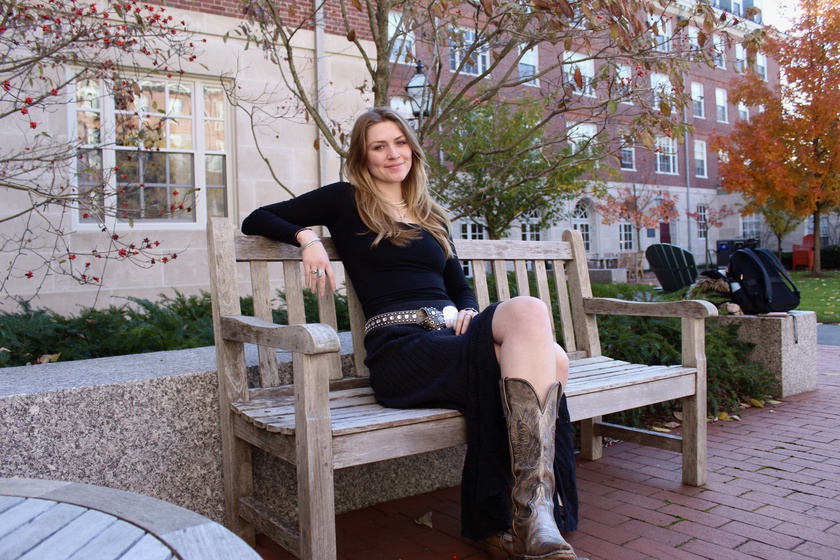{shortcode-e5fc2ecd856653a84495bd2ff7b2b0d18b952ebd}
{shortcode-be29865d8a9c7908fa05930b7f2d42574eaa573c}f I get invited to an event, I will almost always say yes,” L. Madison Pankey ’24 tells me in the Dunster dining hall, her bracelets shifting and colliding as she talks, punctuating her turns of phrase.
For Pankey, partying is not about the place but the people. “My ideal night would be getting ready with my roommates, meeting up with my girlfriends, going out to somewhere with a live band, and dancing, and singing, and just living life, meeting people,” she says.
She describes the eccentric close-knit feel she gets from being with her friends in the crowds of live music performances and in the collective rallies of House spirit. Yardfest and Housing Day are equivalent to the “Super Bowl” for Pankey — she has the face paint and homemade posters to prove it.
Hailing from a suburb just outside of Atlanta, Pankey comes from an area defined by southern “Friday Night Lights” football culture, big homecoming parades, dances, and house parties. Her school was bonded by the nights of full stadiums that shut the rest of town down.
How does she make Harvard compare to that? It’s simple. Though Harvard might not offer the traditional perks of a “party school” — large tailgates at every football game and ample parties to choose from every weekend — Pankey isn’t bothered. Her definition of a party is much more expansive than a physical space.
“You can have fun anywhere you go, if you decide,” she says.
Pankey does find the party scene she’s looking for, and it has a schedule. Find her at Grendel’s on Wednesday nights — or “Grendsdays” as she enthusiastically refers to them — at The Burren, an Irish pub in Somerville on Thursday nights, and at the occasional “big functions” that pop up around campus over the weekend. But most importantly, she finds it in all the nights spent with her friends.
Pankey explains her relationship to partying and her own social life through stoicism, a school of philosophy that emerged from Ancient Greece. She was inspired by Marcus Aurelius’ “Meditations,” which her brother recommended she read when she was a freshman.
“My understanding of stoicism is that it’s controlling what you can control and making the decision to be happy about it,” Pankey says.
There were many things outside of Pankey’s control at the beginning of her freshman year — a pandemic for one. Stoicism helped her navigate new-found intellectual interests and social life after being introduced to a campus limited by weeklong quarantines upon arrival and restrictions on indoor space capacities.
There wasn’t much of a social scene. Most gatherings, for example, occurred on the banks of the Charles River and were broken up fairly quickly.
So, with the guidance of the stoics, she found something she could control in the creative tactics she could employ to meet new people.
“My first friend I met through a window,” she says, smiling in reflection.
She sees positives in arriving at campus during Covid-19, which she says reorganized the state of social dynamics on campus. Pankey says she’s noticed that typically people on the same sports teams or clubs tend to stick to those groups. But five of her seven current roommates were athletes at one point, and she doesn’t know if she would have met them under normal circumstances.
For Pankey, being the “life of the party” means being someone that is “just excited to be there” and someone who attends events “because your friends are hosting it” or, more simply, “just because you want to meet more people.”
Anyone can be the life of the party, she tells me repeatedly. According to Pankey, the main attributes that make someone the life of the party are showing up and building community.
“It’s an understanding of, ‘we’re all trying to make it and we’re all trying to make friends and have a fun time,’” she says.
She insists that there were numerous other people in her life she feels deserve this title, but she also finds the “life of the party” to be a complicated title.
“I don’t want to paint any of them as party girls because they’re so much more than that. They’re scientists. They’re athletes. They’re comedians. They’re writers. They’re all these crazy things,” she says.
But, what makes them the life of the party to Pankey?
“They love life as much as I do,” she says.
— Associate Magazine Editor Jem K. Williams can be reached at jem.williams@thecrimson.com. Follow her on Twitter @jemkwilliams.


